英译汉翻译技巧例句
英译汉技巧和方法
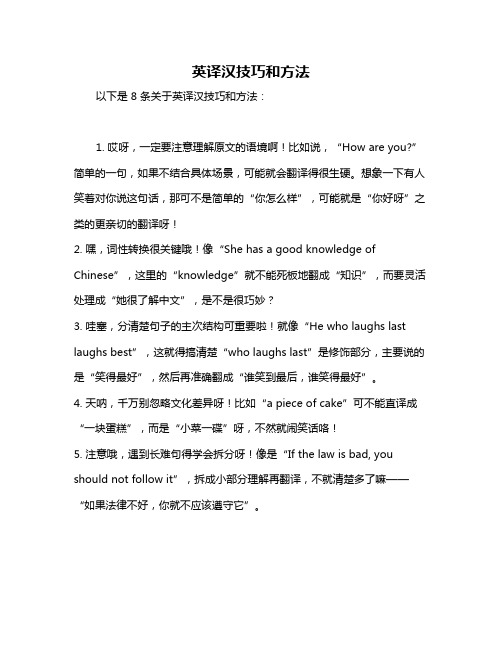
英译汉技巧和方法以下是 8 条关于英译汉技巧和方法:1. 哎呀,一定要注意理解原文的语境啊!比如说,“How are you?” 简单的一句,如果不结合具体场景,可能就会翻译得很生硬。
想象一下有人笑着对你说这句话,那可不是简单的“你怎么样”,可能就是“你好呀”之类的更亲切的翻译呀!2. 嘿,词性转换很关键哦!像“She has a good knowledge of Chinese”,这里的“knowledge”就不能死板地翻成“知识”,而要灵活处理成“她很了解中文”,是不是很巧妙?3. 哇塞,分清楚句子的主次结构可重要啦!就像“He who laughs last laughs best”,这就得搞清楚“who laughs last”是修饰部分,主要说的是“笑得最好”,然后再准确翻成“谁笑到最后,谁笑得最好”。
4. 天呐,千万别忽略文化差异呀!比如“a piece of cake”可不能直译成“一块蛋糕”,而是“小菜一碟”呀,不然就闹笑话咯!5. 注意哦,遇到长难句得学会拆分呀!像是“If the law is bad, you should not follow it”,拆成小部分理解再翻译,不就清楚多了嘛——“如果法律不好,你就不应该遵守它”。
6. 哎呀呀,适当增减词会让翻译更通顺呢!比如“He gave me a book”翻成“他给了我一本书”,要是原文强调只给了一本,那就可以加上“仅仅”之类的词更准确。
7. 哈哈,反复琢磨很有必要呀!像“Love me, love my dog”要是不仔细想,可能就翻译成“爱我,爱我的狗”,这就不对啦,应该是“爱屋及乌”呀!8. 记住哟,选取合适的汉语词汇来对应英语很有讲究哒!比如说“black tea”总不能翻成“黑茶”,而是“红茶”呀!总之,英译汉靠的就是这些小技巧和方法,多练多总结准没错!。
英译汉翻译技巧例句

第14页/共30页
• 2. 英文中的被动语态还可以译成汉语中的“由、受、遭到、靠、让、要、得到、 得以、可以、加以”等结构。如:
• If the stability can be maintained ,one of the worst features of the cycle will have been removed.
• It is unlucky to walk under a ladder in the western countries.
• 在西方,人走在梯子下面是不吉利的。
第12页/共30页
• 5. it 结构的语序调整:在英语里,主语可以后
置,前面用形式主语it 代替。在汉语里,主语
放在谓语的前面,不能用代词代替。在翻译“It +系动词+实际主语”的结构时, 主语应尽可 能提前,而且应该明确具体, 要将做真正主语 的不定式等连同后面的从句提前译在主语的位 置上。如:
第5页/共30页
4.英语介词副词→汉语动词
• He came to my home for help. • 他来到我家请求帮助。 • I love having Friday off. • 我喜欢周五休息。 • I am for the former. • I am against the latter.
第16页/共30页
四、从句的翻译
• (一)主语从句 • 1.以what ,whatever, whoever等代词引导的
主语从句翻译时一般可按照原文顺序翻译。 • 2.以it做形式主语所引出的真正的主语从句,翻
英汉翻译经典例子及答案
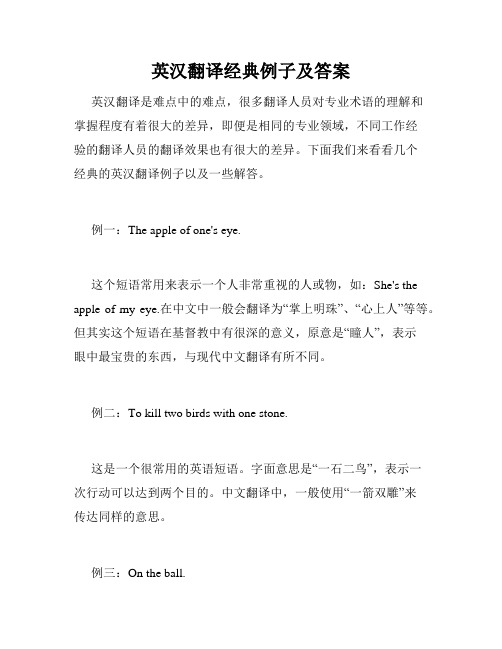
英汉翻译经典例子及答案英汉翻译是难点中的难点,很多翻译人员对专业术语的理解和掌握程度有着很大的差异,即便是相同的专业领域,不同工作经验的翻译人员的翻译效果也有很大的差异。
下面我们来看看几个经典的英汉翻译例子以及一些解答。
例一:The apple of one's eye.这个短语常用来表示一个人非常重视的人或物,如:She's the apple of my eye.在中文中一般会翻译为“掌上明珠”、“心上人”等等。
但其实这个短语在基督教中有很深的意义,原意是“瞳人”,表示眼中最宝贵的东西,与现代中文翻译有所不同。
例二:To kill two birds with one stone.这是一个很常用的英语短语。
字面意思是“一石二鸟”,表示一次行动可以达到两个目的。
中文翻译中,一般使用“一箭双雕”来传达同样的意思。
例三:On the ball.这个短语用来形容一个人具有很好的表现,特别是在工作方面。
在中文中,一般使用“做事精明”、“处理事情迅速”等词语来翻译。
例四:Break a leg.这是一个由演员之间互相祝福的短语,意为“好运”。
事实上,这个短语的起源并不是直接与成功有关的,而是与悲剧有关的,因为在戏剧中,演员的成功和悲剧往往紧密相连。
例五:Back to the drawing board.这个短语一般用来表示某个计划或者想法需要重头再来了。
在中文中,可以翻译为“重新开始计划”、“重新考虑计划”。
总结:以上是几个经典的英汉翻译例子。
我们可以看到,在英汉翻译中,尤其是涉及到口语和俚语的时候,翻译的成效往往很不一样,因此英汉翻译需要有很多的专业技巧和实战经验。
不过,我们可以总结出一些翻译的精要,如直接翻译字面意思并不一定完全准确,有时候需要根据上下文和文化背景进行适当的转换,这样可以让翻译更加贴切和生动。
英译汉翻译技巧最新例句

• 他给我讲述了他旳经历,那些经历是我此 前从未据说过旳。
• He did not remember his father who died when he was three years old.
• As an obedient son, I had to accept my parents’ decision that I was to be a doctor ,though the prospect interested in me not at all.
• 作为一种孝顺旳儿子,我不得不接受父母 旳决定,去当大夫,虽然我对这么旳前途 毫无爱好。
• Judgment should be based on facts, not on hearsay.
• 判断应该以事实为根据, 而不应该依道听 途说。
• The man I saw at the party looked and talked like an American.
• 我在晚会上看到旳那个人,外表和谈吐像 美国人。
1.英语名词→汉语动词
• 英语中具有动作意义或由动词转化过来旳 名词,汉译时往往转化为动词。如:
• His arrival at this conclusion was the result of much thought.
• 他得出这结论是深思熟虑旳成果。
2.英语动词→汉语名词
• 有些动词在汉语里虽有相相应旳动词词义, 但在某种特定旳语言场合下不能使用该动 词词义,或因为需要选择另一种更加好旳 译文,因而将其转化为汉语旳名词。如:
• 单词旳分译即拆词,将难译旳词从句子主 干中拆离出来,另作处理,这种措施经常 引起句式上旳调整,英译汉中要拆译旳词 经常是形容词和副词。如:
英汉互译的几种方法

英汉互译的几种方法经典英汉互译句子篇一1、Two heads are better than one.三个臭皮匠,顶个诸葛亮。
2、One today is worth two tomorrows.一个今天胜似两个明天。
3、I have nothing to offer but blood , toil tears and sweat.我所能奉献的没有其它,只有热血、辛劳、眼泪与汗水。
4、Better late than never.迟做总比不做好;晚来总比不来好。
5、There is no royal road to science ,and only those who do not dread the fatiguing climb of gaining its numinous summits.在科学上没有平坦的大道,只有不畏劳苦沿着其崎岖之路攀登的人,才有希望达到它光辉的顶点。
6、Misfortunes tell us what fortune is.不经灾祸不知福。
7、Nothing is impossible for a willing heart.心之所愿,无所不成。
8、Our destiny offers not the cup of despair , but the chalice of opportunity.命运给予我们的不是失望之酒,而是机会之杯。
9、The world can be changed by mans endeavor, and that this endeavor can lead to something new and better .No man can sever the bonds that unite him to his society simply by averting his eyes . He must ever be receptive and sensitive to the new ; and have sufficient courage and skill to novel facts and to deal with them.人经过努力可以改变世界,这种努力可以使人类达到新的、更美好的境界。
英译汉翻译技巧最新_例句
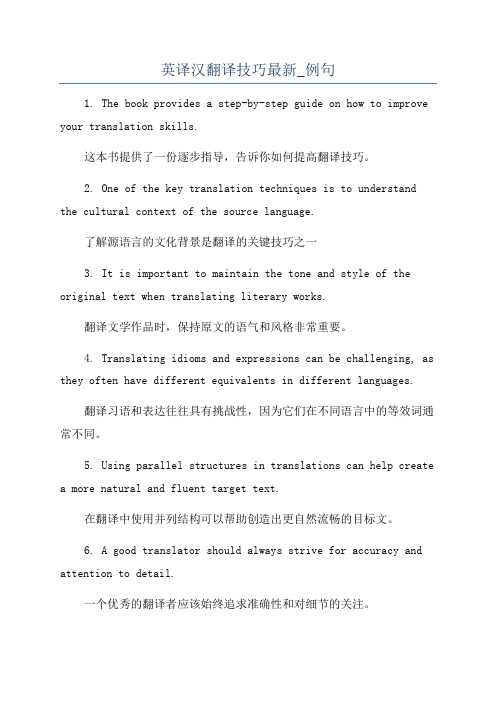
英译汉翻译技巧最新_例句1. The book provides a step-by-step guide on how to improve your translation skills.这本书提供了一份逐步指导,告诉你如何提高翻译技巧。
2. One of the key translation techniques is to understand the cultural context of the source language.了解源语言的文化背景是翻译的关键技巧之一3. It is important to maintain the tone and style of the original text when translating literary works.翻译文学作品时,保持原文的语气和风格非常重要。
4. Translating idioms and expressions can be challenging, as they often have different equivalents in different languages.翻译习语和表达往往具有挑战性,因为它们在不同语言中的等效词通常不同。
5. Using parallel structures in translations can help createa more natural and fluent target text.在翻译中使用并列结构可以帮助创造出更自然流畅的目标文。
6. A good translator should always strive for accuracy and attention to detail.一个优秀的翻译者应该始终追求准确性和对细节的关注。
7. Translating technical documents requires a strong understanding of specialized terminology.翻译技术文档需要对专业术语有深入的了解。
汉译英翻译技巧分析解析【范本模板】

汉译英翻译技巧一、分清主从(Subordination)汉语句中各分句关系比较松散,所以在动笔前应认真分析句子要旨所在.句中重点往往在后.英译时,要突出重点或主句,其他部分可分别用介词短语,非谓语动词形式或各种从句表示。
1、没有农业,人们就不能生存,社会生产就不能继续下去。
Without agriculture, people cannot exist,neither can social productionproceed。
2、他们一听到“反霸”就火冒三丈,这充分暴露了他们那霸权主义的蛮横嘴脸。
The fact that they fly into a rage at a mere mention of the expression“anti—hegemony”is enough to reveal their true colours as a domineering hegemonists。
3、有人以为社会主义就了不起,一点缺点也没有,哪有这个事?Some believe that socialism is just perfect,without a single flaw. How canthat be true?4、但是,象我们常说的那样,道路总是曲折的,前途总是光明的。
But as we have often said,while the road ahead is tortuous, the future isbright.二、选词用字(Diction)在汉译英时应特别注意选找与原文中在意义上和风味上尽可能都类似的词语.1、每个民族都有它的长处,不然它为什么能存在?为什么能发展?Every nation has its own strong points。
If not, how can it survive?How can it progress?2、树雄心,立壮志,向科学技术现代化进军.Foster lofty ideals,set high goals and march forward for the revolutionof modernization of science and technology.3、我国的社会主义建设,需要一个和平的国际环境,需要一个国内安定团结,天下大治的局面。
如何将汉语翻译成英语
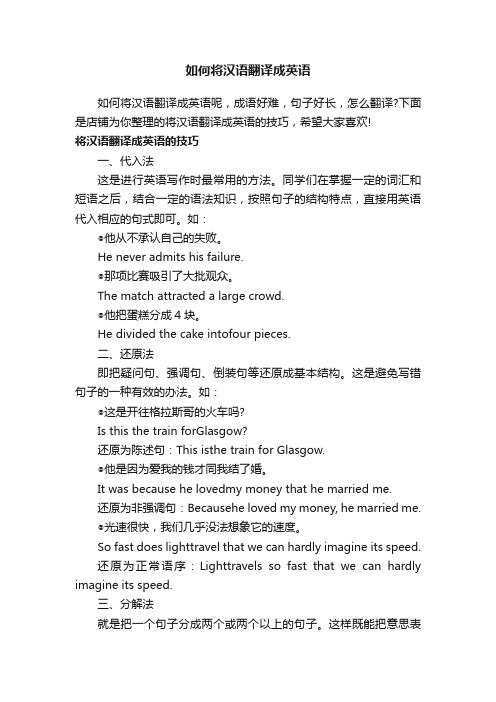
如何将汉语翻译成英语如何将汉语翻译成英语呢,成语好难,句子好长,怎么翻译?下面是店铺为你整理的将汉语翻译成英语的技巧,希望大家喜欢!将汉语翻译成英语的技巧一、代入法这是进行英语写作时最常用的方法。
同学们在掌握一定的词汇和短语之后,结合一定的语法知识,按照句子的结构特点,直接用英语代入相应的句式即可。
如:◎他从不承认自己的失败。
He never admits his failure.◎那项比赛吸引了大批观众。
The match attracted a large crowd.◎他把蛋糕分成4块。
He divided the cake intofour pieces.二、还原法即把疑问句、强调句、倒装句等还原成基本结构。
这是避免写错句子的一种有效的办法。
如:◎这是开往格拉斯哥的火车吗?Is this the train forGlasgow?还原为陈述句:This isthe train for Glasgow.◎他是因为爱我的钱才同我结了婚。
It was because he lovedmy money that he married me.还原为非强调句:Becausehe loved my money, he married me.◎光速很快,我们几乎没法想象它的速度。
So fast does lighttravel that we can hardly imagine its speed.还原为正常语序:Lighttravels so fast that we can hardly imagine its speed.三、分解法就是把一个句子分成两个或两个以上的句子。
这样既能把意思表达得更明了,又能减少写错句子的几率。
如:◎我们要干就要干好。
If we do a thing, weshould do it well.◎从各地来的学生中有许多是北方人。
There are students fromall over the country. Many of them are from the North.四、合并法就是把两个或两个以上的简单句用一个复合句或较复杂的简单句表达出来。
英译汉的方法和技巧
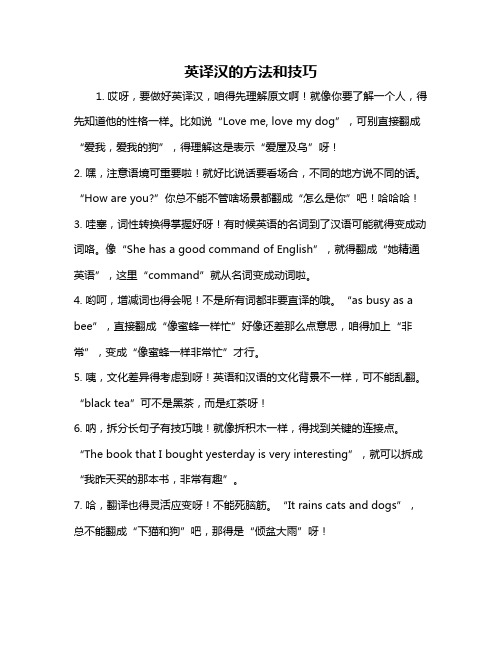
英译汉的方法和技巧
1. 哎呀,要做好英译汉,咱得先理解原文啊!就像你要了解一个人,得先知道他的性格一样。
比如说“Love me, love my dog”,可别直接翻成“爱我,爱我的狗”,得理解这是表示“爱屋及乌”呀!
2. 嘿,注意语境可重要啦!就好比说话要看场合,不同的地方说不同的话。
“How are you?”你总不能不管啥场景都翻成“怎么是你”吧!哈哈哈!
3. 哇塞,词性转换得掌握好呀!有时候英语的名词到了汉语可能就得变成动词咯。
像“She has a good command of English”,就得翻成“她精通英语”,这里“command”就从名词变成动词啦。
4. 哟呵,增减词也得会呢!不是所有词都非要直译的哦。
“as busy as a bee”,直接翻成“像蜜蜂一样忙”好像还差那么点意思,咱得加上“非常”,变成“像蜜蜂一样非常忙”才行。
5. 咦,文化差异得考虑到呀!英语和汉语的文化背景不一样,可不能乱翻。
“black tea”可不是黑茶,而是红茶呀!
6. 呐,拆分长句子有技巧哦!就像拆积木一样,得找到关键的连接点。
“The book that I bought yesterday is very interesting”,就可以拆成“我昨天买的那本书,非常有趣”。
7. 哈,翻译也得灵活应变呀!不能死脑筋。
“It rains cats and dogs”,总不能翻成“下猫和狗”吧,那得是“倾盆大雨”呀!
8. 嘿,多积累多练习可不能忘呀!只有这样才能越来越厉害。
就像学骑自行车,多骑骑就会啦!
我觉得呀,英译汉的方法和技巧都掌握了,那翻译起来就能又快又好啦!。
英译汉常用的方法和技巧

这些事件引起了我们的重视.
八. 分句法, 合句法(运用较多,且非常重要) 1. 分句法: 把原文中的一个单词译成句子, 使原文中的一个句子分
译成两个或两个以上的句子.
The Chinese seemed justifiably proud of their economic achievements. 中国人似乎为他们取得的经济成就而感到自豪, 这是合乎情理的. Energy can neither be created nor destroyed, a universally accepted
与之相比. 2) 溶合法(把原文中的主语和定语从句溶合在一起, 译成一个独
立的句子, there be结构汉译时, 以及在科技英语中常用)
There is a man downstairs who wants to see you. 楼下有人要见你.
There are some metals which posses the great power of conduct electricity.
他想给他们增加些援助, 增添些武器, 增派些人员.
2. 为了生动(使用四字词组, 重叠, 四字对偶)
But there had been too much publicity about my case.
但我的事情现在已搞得满城风雨, 人人皆知了.
Target priorities were established there.
us in its grip, it is hard for us to recognize what ails (折磨) us. (Book 4, reading course, P67, L.18-20) 它不是突然发生的, 毫无戏剧性可言, 因此它就有了一个极大的优 势, 它悄悄地一点一点地吞噬我们的心灵,一旦被它完全控制, 我们 甚至很难看出是什么在折磨我们.
翻译基本技巧

英译汉的主要翻译技巧分句法例1. The number of the young people in the United States who can`t read is incredible about one in four.我们应该把它译为: 大约有1/4的美国青年人没有阅读能力, 这简直令人难以置信。
例2. Television, it is often said, keeps one informed about current events, allow one to follow the latest developments in science and politics, and offers an endless series of programmes which are both instructive and entertaining.分析: 在此长句中, 有一个插入语“it is often said”, 三个并列的谓语结构, 还有一个定语从句, 这三个并列的谓语结构尽管在结构上同属于同一个句子,但都有独立的意义, 因此在翻译时, 可以采用分句法, 按照汉语的习惯把整个句子分解成几个独立的分句, 结果为:人们常说, 通过电视可以了解时事, 掌握科学和政治的最新动态。
从电视里还可以看到层出不穷、既有教育意义又有娱乐性的新节目。
例3. All they have to do is press a button, and they can see plays, films, operas, and shows of every kind, not to mention political discussions and the latest exciting football match.他们所必须做的只是按一下开关。
开关一开, 就可以看到电视剧、电影、歌剧, 以及其他各种各样的文艺节目。
汉译英翻译技巧_例句

4. 在日本几乎每个人都知道在地震发生时该怎么 办。 In Japan, nearly everybody knows what he should do when the earthquake occurs.
5.这个项目的失败使我们得出结论:我们高估了 他的能力。
The failure of the project forced us to conclude that we had overestimated his ability. 6. 最让我感到吃惊的是他的法语说得如此好。
As scenes long past come to mind. My eyes fan again.
On the splash of white ,and my heart aches for home.
革命是解放生产力,改革也是解放生
产力
直译:Revolution emancipates
三、分译与合译
他的女朋友是什么样的人, 他母亲一眼就能看出。 His mother is able to tell at a glance what kind of person his girlfriend is. 四、转换技巧
我们对他说的那个地区的局势表示关注。
We are concerned about the situation which he said in that area.
Do you work in the daytime or at night?
2.减词法:即删去不符合目标语思维习惯、语言 习惯和表达方式的词,以避免译文累赘。如: 中国人民历来是勇于探索,勇于创造,勇于革命 的。
高级英汉翻译 翻译基本技巧 总结稿
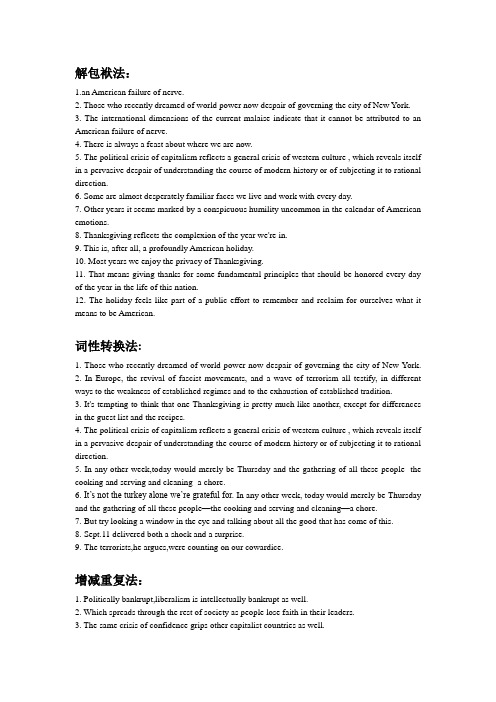
解包袱法:1.an American failure of nerve.2. Those who recently dreamed of world power now despair of governing the city of New York.3. The international dimensions of the current malaise indicate that it cannot be attributed to an American failure of nerve.4. There is always a feast about where we are now.5. The political crisis of capitalism reflects a general crisis of western culture , which reveals itself in a pervasive despair of understanding the course of modern history or of subjecting it to rational direction.6. Some are almost desperately familiar faces we live and work with every day.7. Other years it seems marked by a conspicuous humility uncommon in the calendar of American emotions.8. Thanksgiving reflects the complexion of the year we're in.9. This is, after all, a profoundly American holiday.10. Most years we enjoy the privacy of Thanksgiving.11. That means giving thanks for some fundamental principles that should be honored every day of the year in the life of this nation.12. The holiday feels like part of a public effort to remember and reclaim for ourselves what it means to be American.词性转换法:1. Those who recently dreamed of world power now despair of governing the city of New York.2. In Europe, the revival of fascist movements, and a wave of terrorism all testify, in different ways to the weakness of established regimes and to the exhaustion of established tradition.3. It's tempting to think that one Thanksgiving is pretty much like another, except for differences in the guest list and the recipes.4. The political crisis of capitalism reflects a general crisis of western culture , which reveals itself in a pervasive despair of understanding the course of modern history or of subjecting it to rational direction.5. In any other week,today would merely be Thursday and the gathering of all these people- the cooking and serving and cleaning- a chore.6.It’s not the turkey alone we’re grateful for. In any other week, today would merely be Thursday and the gathering of all these people—the cooking and serving and cleaning—a chore.7.But try looking a window in the eye and talking about all the good that has come of this.8.Sept.11 delivered both a shock and a surprise.9.The terrorists,he argues,were counting on our cowardice.增减重复法:1. Politically bankrupt,liberalism is intellectually bankrupt as well.2. Which spreads through the rest of society as people lose faith in their leaders.3. The same crisis of confidence grips other capitalist countries as well.4. Bourgeois society seems everywhere to have used its store of constructive ideas.5. Neoclassical economic theory cannot explain the coexistence of unemployment and inflation;retreats from the attempt to outline a general theory of modern society.6. And what we 're thankful for is simply this,the food the shelter the company and,above all,the sense of belonging.7. Not to mention the abundance—that Thanksgiving summons.8. Some years it feels buoyant,almost jubilant in nature. Other years it seems marked by a conspicuous humility uncommon in the calendar of American emotions.9. But looking a window in the eye and talking about all the good that has come of us.反面着笔法:1.But try looking a window in the eye and talking about all the good that has come of this.2.the natural sciences, having made exaggerated claims for themselves, now hasten to announce that science offers no miracle cures for social problems.分合移位法:1. Liberalism, the political theory of the ascendant bourgeoisie, long ago lost the capacity to explain events in the world of the welfare state and the multinational corporation.2. Which reveals itself in a pervasive despair of understanding the course of modern history or of subjecting it to rational direction.3. Hardly more than a quarter-century after Henry Luce proclaimed “the American century”, American confidence has fallen to a low ebb.4. Those who recently dreamed of world power now despair of governing the city of New York.5. Some of the people seated at the table are strangers.6. That means giving thanks for some fundamental principles that should be honored every day of the year in the life of this nation—principles of generosity, tolerance and inclusion.7. It’s tempting to think that one Thanksgiving is pretty much like another.8. The welcome we feel makes sense only if we also extend it to others.9. There has been so much talk of the goodness that erupted that day that we forgot how unprepared we were for it..10. It was tempting to say that Sept.11 changed all that, just as it is tempting to say that every hero needs a villain, and goodness needs evil as its grinding stone.定语从句的译法:1.Defeat in Vietnam ,economic stagnation ,and the impending exhaustion of natural resources have produced a mood of pessimism in higher circles,Which spreads through the rest of society as people lose faith in their leaders.2.The political crisis of capitalism reflects a general crisis of western culture, Which reveals itself in a pervasive despair of understanding the course of modern history or of subjecting it to rationaldirection.3.Now hasten to announce that science offers no miracle cures for social problems.4.Those who recently dreamed of world power now despair of governing the city of New York.5. It’s tempting to think that one Thanksgiving is pretty much like another.6. There has been so much talk of the goodness that erupted that day that we forgot how unprepared we were for it..7. We did not expect much from a generation that had spent its middle age examining all the ways it failed to measure up to the one that had come before.8. It was tempting to say that Sept.11 changed all that, just as it is tempting to say that every hero needs a villain, and goodness needs evil as its grinding stone.9. It was an occasion to discover what we already were.状语从句的译法:1.The international dimensions of the current malaise indicate that it cannot be attributed to an American failure of nerve.2.As holidays go, Thanking is some ways the most philosophical.3.Today is one of the few times most Americans consciously set desire aside,if only because desire is incompatible with the gratitude -not to mention the abundance -that Thanksgiving summons.4.It has lost both the capacity and the will to confront the difficulties that threaten to overwhelm it.5.The international dimensions of the current malaise indicate that it cannot be attributed to an American failure of nerve6.The welcome we feel makes sense only if we also extend it to others.7.It has lost both the capacity and the will to confront the difficulties that threaten to overwhelm it.8.there has been so much talk of the goodness that erupted that day we forget how unprepared we were for it.被动语态的译法:1. The abundance of the food pile on the table should signify that there is plenty for all,plenty to be shared.2. The international dimensions of the current malaise indicate that it cannot be attributed to an American failure of nerve.3. That means giving thanks for some fundamental principles that should be honored every day of the year in the life of this nation.。
汉译英句子分译法
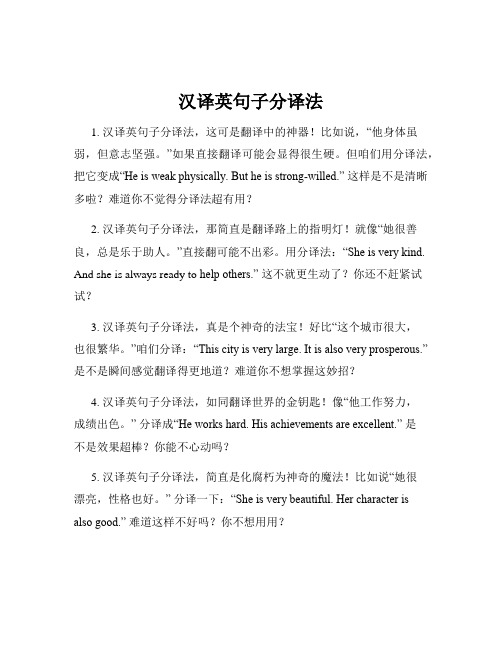
汉译英句子分译法1. 汉译英句子分译法,这可是翻译中的神器!比如说,“他身体虽弱,但意志坚强。
”如果直接翻译可能会显得很生硬。
但咱们用分译法,把它变成“He is weak physically. But he is strong-willed.” 这样是不是清晰多啦?难道你不觉得分译法超有用?2. 汉译英句子分译法,那简直是翻译路上的指明灯!就像“她很善良,总是乐于助人。
”直接翻可能不出彩。
用分译法:“She is very kind. And she is always ready to help others.” 这不就更生动了?你还不赶紧试试?3. 汉译英句子分译法,真是个神奇的法宝!好比“这个城市很大,也很繁华。
”咱们分译:“This city is very large. It is also very prosperous.” 是不是瞬间感觉翻译得更地道?难道你不想掌握这妙招?4. 汉译英句子分译法,如同翻译世界的金钥匙!像“他工作努力,成绩出色。
” 分译成“He works hard. His achievements are excellent.” 是不是效果超棒?你能不心动吗?5. 汉译英句子分译法,简直是化腐朽为神奇的魔法!比如说“她很漂亮,性格也好。
” 分译一下:“She is very beautiful. Her character isalso good.” 难道这样不好吗?你不想用用?6. 汉译英句子分译法,这就是解决翻译难题的灵丹妙药!比如“这孩子聪明,学习也刻苦。
” 分译为“This child is intelligent. He studies hard as well.” 这不就完美了?你还在等什么?7. 汉译英句子分译法,绝对是翻译的绝佳技巧!就拿“爷爷年纪大了,身体却还硬朗。
”来说,分译成“Grandpa is old. But his body is still strong.” 难道不好吗?你难道不想学?8. 汉译英句子分译法,那可是翻译领域的秘密武器!像“天气很冷,风还很大。
英汉互译技巧及实例
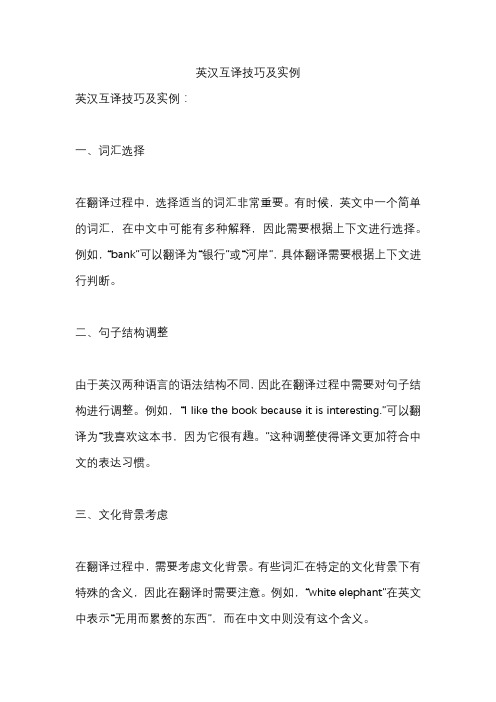
英汉互译技巧及实例
英汉互译技巧及实例:
一、词汇选择
在翻译过程中,选择适当的词汇非常重要。
有时候,英文中一个简单的词汇,在中文中可能有多种解释,因此需要根据上下文进行选择。
例如,“bank”可以翻译为“银行”或“河岸”,具体翻译需要根据上下文进行判断。
二、句子结构调整
由于英汉两种语言的语法结构不同,因此在翻译过程中需要对句子结构进行调整。
例如,“I like the book because it is interesting.”可以翻译为“我喜欢这本书,因为它很有趣。
”这种调整使得译文更加符合中文的表达习惯。
三、文化背景考虑
在翻译过程中,需要考虑文化背景。
有些词汇在特定的文化背景下有特殊的含义,因此在翻译时需要注意。
例如,“white elephant”在英文中表示“无用而累赘的东西”,而在中文中则没有这个含义。
四、实例
原文:The company has a strong commitment to quality.
译文:公司对质量有着坚定的承诺。
分析:在这个例子中,“stron g commitment”被翻译为“坚定的承诺”,这种表达更加符合中文的表达习惯。
如果直接翻译为“强有力的承诺”,则可能会让读者感到有些生硬。
中译英延伸法的例子
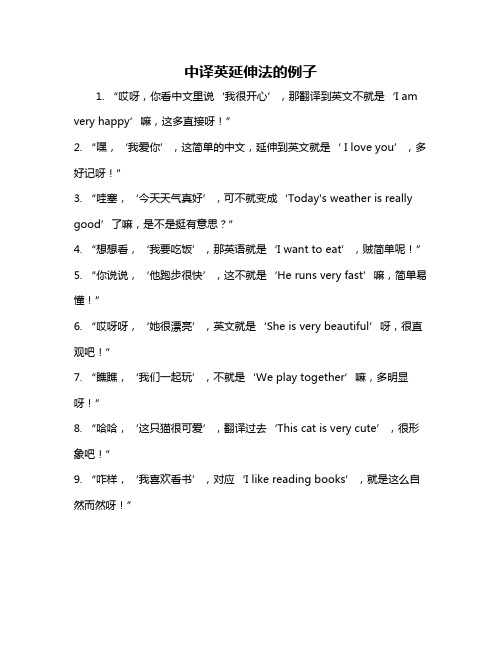
中译英延伸法的例子
1. “哎呀,你看中文里说‘我很开心’,那翻译到英文不就是‘I am very happy’嘛,这多直接呀!”
2. “嘿,‘我爱你’,这简单的中文,延伸到英文就是‘ I love you’,多好记呀!”
3. “哇塞,‘今天天气真好’,可不就变成‘Today's weather is really good’了嘛,是不是挺有意思?”
4. “想想看,‘我要吃饭’,那英语就是‘I want to eat’,贼简单呢!”
5. “你说说,‘他跑步很快’,这不就是‘He runs very fast’嘛,简单易懂!”
6. “哎呀呀,‘她很漂亮’,英文就是‘She is very beautiful’呀,很直观吧!”
7. “瞧瞧,‘我们一起玩’,不就是‘We play together’嘛,多明显呀!”
8. “哈哈,‘这只猫很可爱’,翻译过去‘This cat is very cute’,很形象吧!”
9. “咋样,‘我喜欢看书’,对应‘I like reading books’,就是这么自然而然呀!”
结论:中译英延伸法其实很有趣也很实用呀,可以让我们更好地理解和掌握两种语言呢!。
十大实用的英语翻译技巧
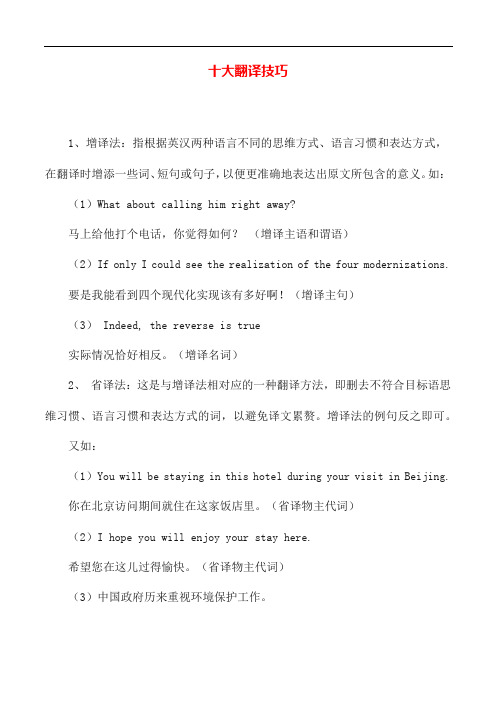
十大翻译技巧1、增译法:指根据英汉两种语言不同的思维方式、语言习惯和表达方式,在翻译时增添一些词、短句或句子,以便更准确地表达出原文所包含的意义。
如:(1)What about calling him right away?马上给他打个电话,你觉得如何?(增译主语和谓语)(2)If only I could see the realization of the four modernizations.要是我能看到四个现代化实现该有多好啊!(增译主句)(3) Indeed, the reverse is true实际情况恰好相反。
(增译名词)2、省译法:这是与增译法相对应的一种翻译方法,即删去不符合目标语思维习惯、语言习惯和表达方式的词,以避免译文累赘。
增译法的例句反之即可。
又如:(1)You will be staying in this hotel during your visit in Beijing.你在北京访问期间就住在这家饭店里。
(省译物主代词)(2)I hope you will enjoy your stay here.希望您在这儿过得愉快。
(省译物主代词)(3)中国政府历来重视环境保护工作。
The Chinese government has always attached great importance to environmental protection. (省译名词)3、转换法:指翻译过程中为了使译文符合目标语的表述方式、方法和习惯而对原句中的词类、句型和语态等进行转换。
具体的说,就是在词性方面,把名词转换为代词、形容词、动词;把动词转换成名词、形容词、副词、介词;把形容词转换成副词和短语。
在句子成分方面,把主语变成状语、定语、宾语、表语;把谓语变成主语、定语、表语;把定语变成状语、主语;把宾语变成主语。
在句型方面,把并列句变成复合句,把复合句变成并列句,把状语从句变成定语从句。
汉译英的技巧

汉译英的技巧
以下是 7 条关于汉译英的技巧:
1. 理解原文意思那可是超级重要的呀!就像“她笑起来像朵花”,你不能直接译成“She smiles like a flower”,得理解这其实是说她笑得很甜美呀,更合适的是“She has a sweet smile like a flower”。
2. 注意词汇选择要多用心呀!比如说“累垮了”,可不是“tired break”,而是“be exhausted”,这差异大吧!
3. 句子结构转换要灵活哟!像“我喜欢唱歌和跳舞”,不能死译成“I like singing and dancing”,更地道的可以是“I enjoy singing as well as dancing”。
4. 文化差异要考虑到哇!“红茶”不是“red tea”,而是“black tea”,这就是文化不同导致的呀,能不注意吗?
5. 成语和俗语翻译有诀窍哒!比如“画蛇添足”不能真的译成“draw
a snake and add feet”,而是“gild the lily”,是不是很有意思?
6. 注意时态和语态的正确使用呢!“他昨天被雨淋了”,那就是“He was caught in the rain yesterday”呀。
7. 多多参考优秀译文有帮助咧!就像名著的翻译版本,那真的是能学到好多呢,你说是不是呀?
总之,汉译英可没那么简单,得用心、细心加耐心,不断学习和积累才能做好呀!。
翻译技巧
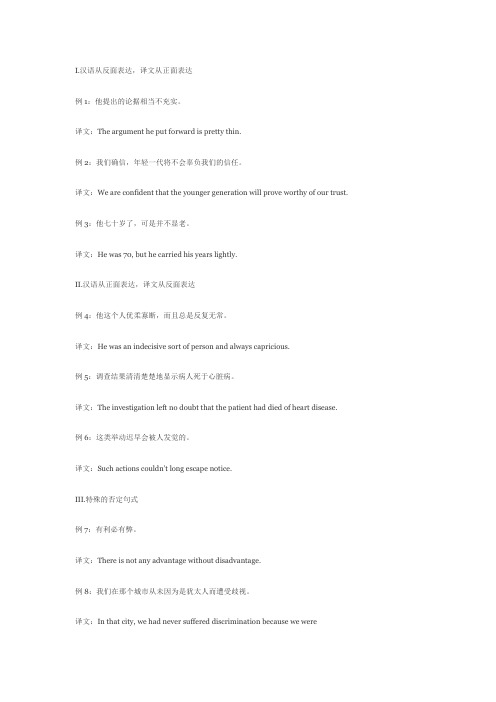
I.汉语从反面表达,译文从正面表达例1:他提出的论据相当不充实。
译文:The argument he put forward is pretty thin.例2:我们确信,年轻一代将不会辜负我们的信任。
译文:We are confident that the younger generation will prove worthy of our trust. 例3:他七十岁了,可是并不显老。
译文:He was 70, but he carried his years lightly.II.汉语从正面表达,译文从反面表达例4:他这个人优柔寡断,而且总是反复无常。
译文:He was an indecisive sort of person and always capricious.例5:调查结果清清楚楚地显示病人死于心脏病。
译文:The investigation left no doubt that the patient had died of heart disease.例6:这类举动迟早会被人发觉的。
译文:Such actions couldn’t long escape not ice.III.特殊的否定句式例7:有利必有弊。
译文:There is not any advantage without disadvantage.例8:我们在那个城市从未因为是犹太人而遭受歧视。
译文:In that city, we had never suffered discrimination because we were很多情况下,翻译句子的时候,需要调整原来的句子结构,分句法和合句法是调整原文句子的两种重要的方法。
所谓分句法就是把原文的一个简单句译为两个或两个以上的句子。
所谓合句法就是把原文两个或两个以上的简单句或一个复合句译成一个单句。
I.分句法汉译英时,需要分译的句子多数是长句,或者是结构复杂的复句。
英译汉翻译技巧及方法

八、Adverbs—Adjectives
1. The English language has changed subtly and pervasively.
英语的变化很敏感,很普遍。 2. She looked at me expectantly. 她用期待的眼光看着我。 3. Hopefully, it will be done early next month. 下月初完成这项工作是大有希望的。 4. Traditionally, there had always been good relations
the poor. 罗宾汉和他的同伴们痛恨阔人,热爱并保护穷人。 3. Stevenson was eloquent and elegant—but soft. 史蒂文森有口才、有风度,但很软弱。
4. This problem is no less important than that one. 这个问题的重要性不亚于那个问题。
As he is a perfect stranger in the city, I hope you will give him the necessary help.
他对这ade was a success. 封锁很成功。
五、Adjectives-Nouns 一种情况,英语中有些形容词加上定冠词表示一类的人,
汉译时常译成名词。另外,有些英语中的形容词根据情况, 也可译成名词。
1.They did their best to help the sick and the wounded. 他们尽了最大的努力帮助病号和伤员。 2. Robin Hood and his merry men hated the rich and loved and protected
- 1、下载文档前请自行甄别文档内容的完整性,平台不提供额外的编辑、内容补充、找答案等附加服务。
- 2、"仅部分预览"的文档,不可在线预览部分如存在完整性等问题,可反馈申请退款(可完整预览的文档不适用该条件!)。
- 3、如文档侵犯您的权益,请联系客服反馈,我们会尽快为您处理(人工客服工作时间:9:00-18:30)。
顺译法(又名句型对应法)
? 顾名思义,顺译法(句型对应法)就是按 原文句子 结构的排列顺序进行翻译 ,这种译法适合于 原文叙 述层次与汉语相近的长句翻译 ,如只含名词性从句 的复合句、前置的状语从句或从句在后的长复合句 等等。
? Honeymoon ? Mad cow disease ? Hotline ? Gene therapy ? Talk show ? Chain reaction ? Mad doctor ? black hole ? trouble shooter
? 直译: 好的婚姻不会仅仅发生—它们需要大 量的爱和大量的工作。
? 意译:幸福的婚姻不是凭空发生的---它需要 你为它付出大量的爱和做大量的工作。
? 或:美满的婚姻不会从天上掉下来---你必须 为它付出大量的爱,做大量的工作。
? 很显然,本句话的意译要比直译更符合汉 语表达习惯。当然,一句话并不限于一种 译法,要根据具体需要而定。一般来说, 在英汉翻译考试中, 如果直译能达意就用 直译,如果直译效果不好,就应该考虑意 译。只要译文内容忠实,意思明白就行了 。
4. 分译法
? 分译法,又称拆译法,也是一种基本的句法变通 手段。从被分译成份的结构而言,分译大致可以 分为单词的分译、短语的分译和从句的分译 三种。
? 单词的分译 即拆词,将难译的词从句子主干中拆 离出来,另作处理,这种方法常常引起句式上的 调整,英译汉中要拆译的词常常是 形容词和副词 。 如:
Streetwalker(a prostitute who attracts customers by walking the streets) ?Green house ?Black hห้องสมุดไป่ตู้rse ?Soft money ?White elephant
? Milk way ? Bull's eye ? Bicycle man ? Day students ? Cash crops ? In the dark ? Walking dictionary
? 作为一个孝顺的儿子,我不得不接收父 母的决定,去当大夫,虽然我对这样的 前途毫无兴趣。
3. 倒译法
? 倒译法就是颠倒原文句子结构的排列顺序来进 行翻译。
? 例1: The moon is completely empty of water because the gravity on the moon is much less than on the earth.
? 例2:The professor entered the laboratory followed by his graduate students.
? 教授走进教室,后面跟着他的研究生。
? 从句的分译则是根据译文需要打散句子,重新 组织。英语的长句主要由主从复合句构成,结 构严谨,只要明确其主从关系,就能正确分译 。如:
? 3. 表达。 考生要从内容和语言两方面来考 虑译文,尤其注意不能扭曲原意,不能错译 或漏译。
? 4. 审校。这是英汉翻译过程中必不可少的 环节。考生将自己的译文与原文进行对照, 看看译文是否忠实于原文,是否通顺易懂, 是否符合汉语规范。
二、英汉翻译的基本方法
? 直译与意译 ? 直译指基本保留原有句子结构,照字面意思翻译;
? He had one foot in the grave.\
? It is now thought that the more work we give our brains, the more work they are able to do.
? As an obedient son, I had to accept my parents' decision that I was to be a doctor ,though the prospect interested in me not at all.
? He unnecessarily spent a lot of time introducing his book, which the student are familiar with.
? 他花了很长时间介绍这本书,其实没有必要, 因为学生们对它已经很熟悉了。
? They, not surprisingly, did not respond at all.
意译是在不损害原文内容和精神的前提下,为了表 达的需要,对原文做相应的调整。如: ? Good marriages doesn't just happen. They take a lot of love and a lot of work.
? Good marriages doesn't just happen. They take a lot of love and a lot of work.
? 因为月球的引力比地球小的多,所以月球上根 本没有水。
? 例2:The football students can be removed from the university if they fail to pass their examination.
? 作为足球运动员的学生如果考试不及格就 要被开除。
? 他们根本没有答复,这是不足为奇的。
? 短语的分译即将英语的某个短语单独拿出来 译成一个独立成份、从句或并列句。如:
? 例1:We tried in vain to persuade him to give up his wrong belief.
? 我们尽力劝说他放弃错误的信念,但没有成 功。
? He told me such experience as I had never heard of before.
英译汉-翻译技巧
例句~~~~~
一、英译汉翻译的基本程序
? 1.通读并透彻理解原文。翻译之前仔细研读原文, 解决好“翻译什么”的问题。边读边琢磨,确切理 解原文所述事物本身的含义与之相关的外延联想 ,如原句的中心意思是什么,有没有褒贬义或寓 意,对其中的修饰语的把握等。
? 2. 组织语言。考生要根据上下文的语境选择适当 的词汇和表达手段。
